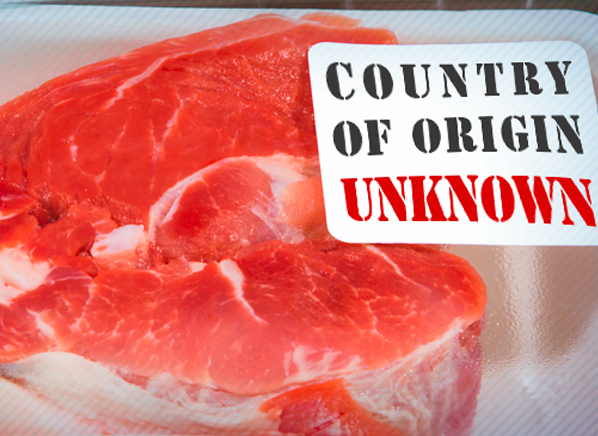U.S. Secretary of Agriculture Sonny Perdue has closed the door on the reinstatement of mandatory country-of-origin (COOL) labeling for beef, telling the U.S. House of Representatives’ Agriculture Committee in March that mandatory COOL is not going to happen “unless we want to do a billion-dollar litigation damage with Canada and Mexico.”
Instead, Perdue said in his testimony that USDA is seeking to use its existing labeling authority to find a path forward that conforms to the World Trade Organizations (WTO) regulations. Country-of-Origin labeling laws were repealed by Congress in 2015 under threat of $1 billion retaliatory tariffs from Canada and Mexico.
Rather than pushing forward with mandatory country-of-origin labeling for beef, Perdue says USDA is considering limiting the use of its voluntary “Product of the USA” label to animals that are slaughtered and processed in the U.S.
“USDA is trying to thread the needle honestly, with transparency, so the consumer knows what they get and so we can help the producer feel they get value for cattle that have been grown and processed in the U.S.,” Perdue told the House Agriculture Committee in his March testimony.
Cattle rancher advocacy groups like R-CALF USA, the largest producer-only cattle trade association in the U.S., have been lobbying for the reinstatement of mandatory COOL for beef since its repeal by Congress in 2015. R-CALF USA and other cattle groups have also filed lawsuits against USDA demanding it reinstate mandatory COOL for beef.
R-CALF USA isn’t pleased with Perdue’s decision to go the voluntary “Made in the USA” labeling route. During a recent meeting with cattlemen and women in Red Bluff CA, R-CALF USA CEO Bill Bullard said Perdue’s COOL scheme is a “wolf in sheep’s clothing.”
“There are two types of country-of-origin labeling,” Bullard said at the meeting. “A mandatory system, listing where an animal was born, raised and slaughtered, helps the entire cattle supply chain. The other, Perdue’s scheme, discloses only where an animal was grown and processed. It only benefits beef packers and beef importers.”
Bullard says meatpackers and importers from as many as 20 foreign countries are feeding the American market with cheaper beef and passing it off to unsuspecting consumers as a domestic product with “Made in the USA” labels.
“We don’t live in a world where multinational beef packers want to help America’s cattle producers increase demand for live cattle exclusively born and raised in the United States,” he told the cattlemen and women. “It’s against their financial interests to do so,” he added R-CALF and other groups aren’t accepting the decision by Perdue and the Trump administration to go the voluntary route. Instead the groups will continue to fight in court and by lobbying Congress and the administration to get mandatory COOL reinstated.

The newest approach in their fight to reinstate COOL is to do so on a state-by-state basis. For example, in Washington state the House recently passed a bill that would require grocery stores to divide “USA Beef” from “imported beef” in store meat cases. Each would be designated as such with “conspicuous signage,” according to the bill. An animal born and slaughtered in the U.S. would qualify as USA beef so long as it was never out of the country for more than 60 days. The bill is currently being debated in the Washington state Senate.
In South Dakota the state legislature also has jumped into the mandatory COOL debate. It recently sent a resolution favoring mandatory COOL to President Trump. The joint resolution passed the South Dakota State Senate 34-to-0 and the House 60-to-3. The resolution also calls for President Trump to revisit the USMCA trade agreement and to include mandatory COOL in it.
Look for mandatory COOL advocates to take this state-by-state approach, using the Washington state and South Dakota examples, to other cattle-producing states in light of USDA’s decision to go the voluntary labeling route.
Additionally, the Trump Administration’s decision in late February to open the U.S. market to fresh beef imports from Brazil has added flames to the fire among U.S, cattle producers.
In response to the administration’s decision, R-CALF has sent a research paper to Congressional offices in Washington. In the paper the association says Brazil is a country with a “history of engaging in corrupt food safety practices.” R-CALF CEO Bullard says the lack of mandatory country-of-origin labeling “means beef produced by America’s cattle farmers and ranchers cannot compete against the soon-to-arrive quantities of Brazilian beef.” He adds that the only way to end “consumer deception” is for Congress to pass legislation requiring mandatory COOL on all beef products sold in retail stores in the U.S.
The battle for mandatory country-of-origin labeling for beef is far from over despite Secretary of Agriculture Perdue’s testimony to Congress in March that the Trump Administration has decided to go the voluntary labeling route. Instead the focus of advocates will primarily be on members of Congress, particularly members of the House and Senate Agriculture committees, and at the state level. R-CALF will likely continue to lobby the Trump Administration but it has had very little luck in doing so thus far. Stay tuned for round two.







